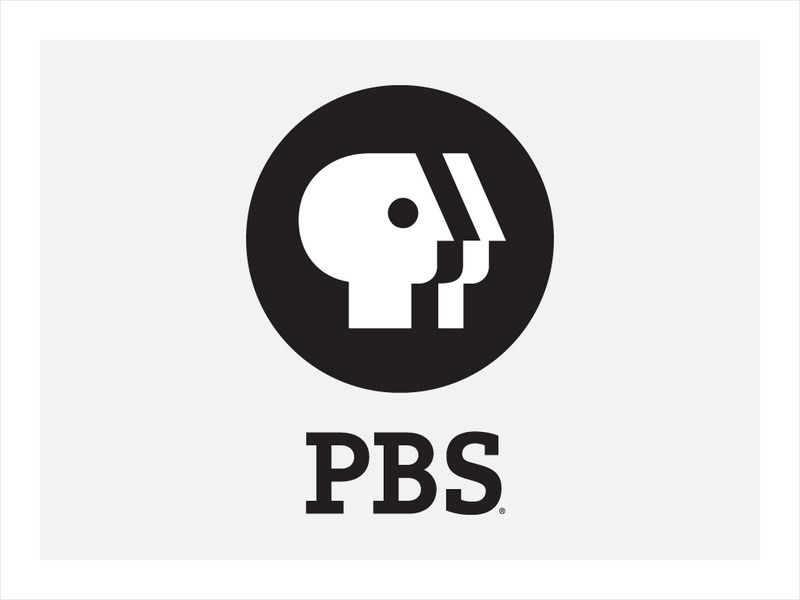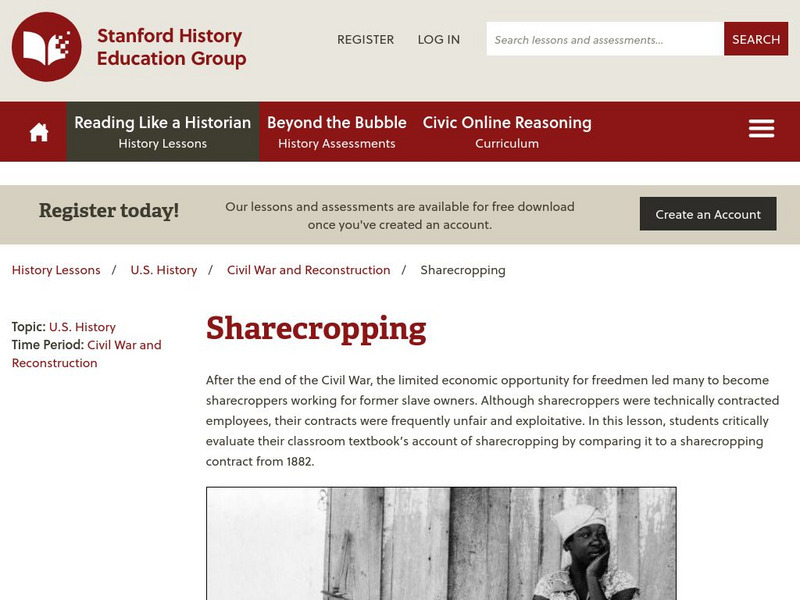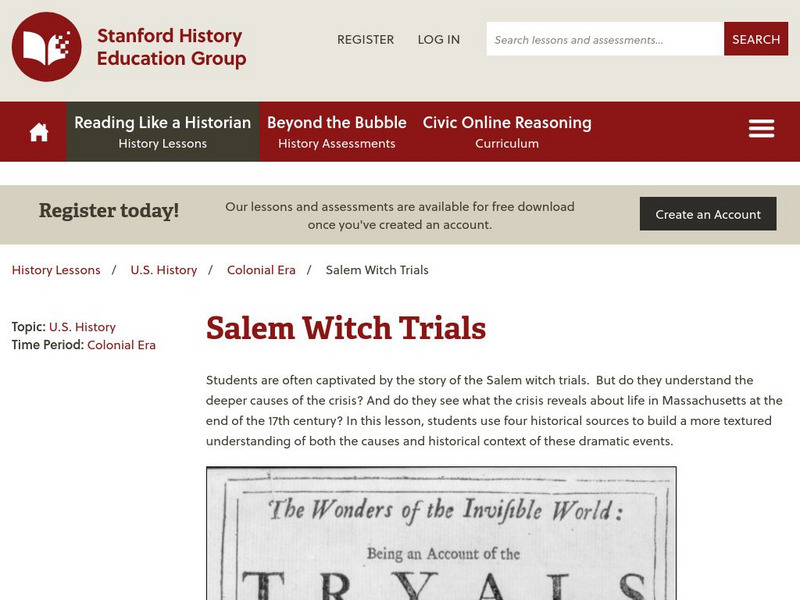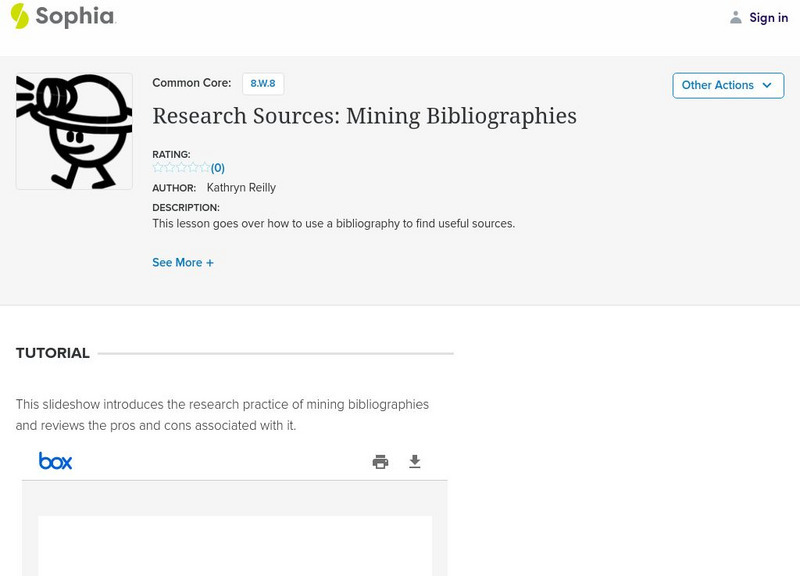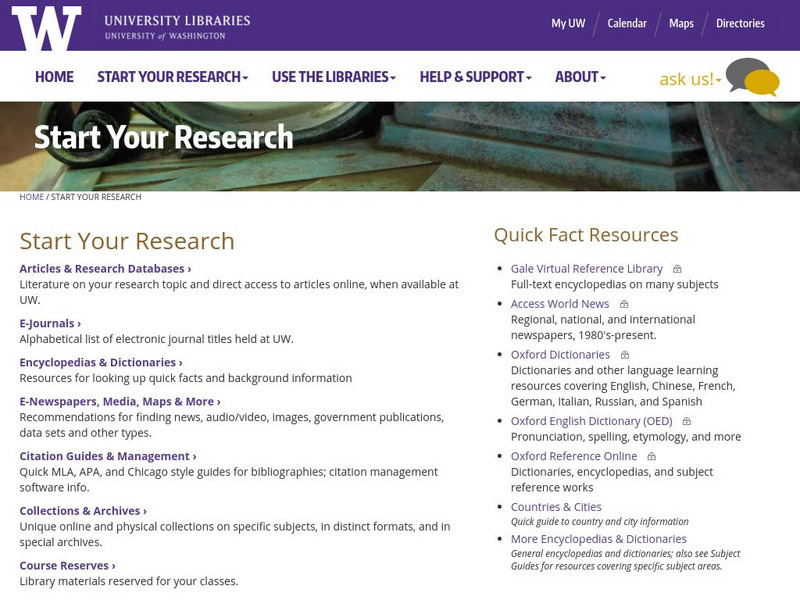Wyzant
Wyzant: History and Politics Out Loud
A searchable archive of politically significant audio materials for scholars, teachers, and students.
Stanford University
Sheg: Document Based History: Reading Like a Historian: Progressivism
[Free Registration/Login Required] Students use primary source documents to investigate central historical questions. This unit explores perspectives on the key issues of the Progressive Era.
Other
Bowdoin: Reading, Writing, Researching for History: A Guide for College Students
Reference guide material discusses how to research, write and read for history.
PBS
Pbs: Ken Burns America
Find assets by location and call up specific item information including films, connected themes and related classroom resources. A wealth of primary source images from events in American history.
Stanford University
Beyond the Bubble: History Assessments
[Free Registration/Login Required] A collection of innovative assessments, interactive rubrics, and annotated samples of student work with an emphasis on primary source documents for the use in a wide range of history concepts.
Stanford University
Sheg: Document Based History: Reading Like a Historian: Evaluating Sources
[Free Registration/Login Required] Are all historical sources equally trustworthy? How might the reliability of a historical document be affected by the circumstances under which it was created? In this activity, students sharpen their...
Stanford University
Sheg: Document Based History: Reading Like a Historian: Historical Thinking
[Free Registration/Login Required] This chart elaborates on the historical reading skills of sourcing, corroboration, contextualization, and close reading. In addition to questions that relate to each skill, the chart includes...
Stanford University
Sheg: Reading Like a Historian: Intro to Historical Thinking: Lunchroom Fight
[Free Registration/Login Required] A fight breaks out in the lunchroom and the principal needs to figure out who started it. But when she asks witnesses what they saw, she hears conflicting accounts. Why might these accounts differ? As...
Stanford University
Sheg: Document Based History: Reading Like a Historian: Sharecropping
[Free Registration/Login Required] Students solve a problem surrounding a historical question by reading primary source documents. This historical inquiry lesson allows students to critically evaluate their classroom textbook's account...
Stanford University
Sheg: Document Based History: Reading Like a Historian: Stamp Act
[Free Registration/Login Required] Students solve a problem surrounding a historical question by reading primary source documents. This historical inquiry lesson allows students to engage in key aspects of historical thinking as they...
Stanford University
Sheg: Document Based History: Reading Like a Historian: Salem Witch Trials
[Free Registration/Login Required] Students read primary source documents to solve a problem surrounding a historical question. This document-based inquiry lesson allows students to use four historical sources to build a more textured...
Stanford University
Sheg: Document Based History: Reading Like a Historian: Battle of Little Bighorn
[Free Registration/Login Required] Students solve a problem surrounding a historical question by reading primary source documents. This historical inquiry lesson allows students to explore causes of the Battle of Little Bighorn by...
Stanford University
Sheg: Document Based History: Reading Like a Historian: Homestead Strike
[Free Registration/Login Required] Students solve a problem surrounding a historical question by reading primary source documents. This historical inquiry lesson allows students to use the historical thinking skills of corroboration,...
Sophia Learning
Sophia: Research Sources: Mining Bibliographies
This slideshow lesson focuses on mining bibliographies, or searching other bibliography pages on your topic to locate potential sources for your own research. It discusses the pros and cons of mining bibliographies.
Sophia Learning
Sophia: Research Sources: Periodicals
This slideshow lesson focuses on the use of periodicals as research sources; it discusses the pros of using periodicals as organizational aids and in research of current events and also the cons of periodical's lack of depth and possible...
Annenberg Foundation
Annenberg Learner: America's History in the Making: Historical Thinking Interactives
Six interactive activities are presented that walk students through how to use their critical thinking skills in the analysis of historical artifacts and documents. The sixth one explains how to balance the various perspectives that...
Stanford University
Stanford University: Catalogs and Search Tools
This resource provides Stanford University catalog collections, as well as databases and search tools.
University of California
Uc Irvine: Distinguishing Between Primary & Secondary Sources
This site has an online quiz to test your knowledge of primary and secondary sources.
Other
University of Washington Libraries: Starting Research
If you need help knowing where to start your research, or if you're a teacher looking for a way to help students understand the research process, this resource is terrific. Interactive tutorials on a number of topics offer review quizzes...
Annenberg Foundation
Annenberg Learner: Interactives: Historical and Cultural Contexts
This interesting interactive website explains kinds of primary sources and gives you the chance to identify them in some games.
Polk Brothers Foundation Center for Urban Education at DePaul University
Depaul University: Center for Urban Education: Compare Articles [Pdf]
This Center for Urban Education resource provides a downloadable graphic organizer designed for comparing and contrasting nonfiction articles.
Polk Brothers Foundation Center for Urban Education at DePaul University
De Paul University: Center for Urban Education: Compare Central Idea Across Mult Texts [Pdf]
This Center for Urban Education resource provides a downloadable graphic organizer designed for comparing a central idea across multiple texts.
Other
Groucher College: Library Research Techniques for the Professional Scholar
This site provides clear techniques and guidelines on finding secondary and primary research for use in scholarly analysis that involves looking at the evidence and discovering a pattern that makes meaning.
Duke University
Duke University Libraries: Finding Primary Sources
Finding primary sources can be difficult and confusing at times. This site provides a list of history databases, rare books and manuscripts, and research guides for those looking for primary resources such as diaries, letters,...



